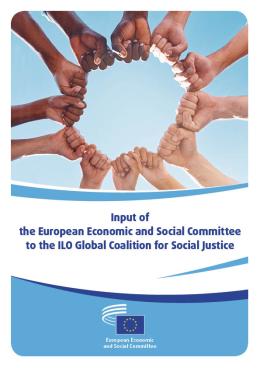European Economic
and Social Committee
AKP in Afrika
Od prve konvencije iz Loméja (1975) do Sporazuma iz Cotonouja (2000–2021) so partnerstva EU-AKP urejala odnose med EU in 79 članicami skupine afriških, karibskih in pacifiških držav (AKP), ki se je nedavno preimenovala v Organizacijo afriških, karibskih in pacifiških držav.
EESO si je v vsem tem obdobju skupaj s civilno družbo držav AKP prizadeval za priznanje ključne vloge, ki jo imajo nedržavni akterji pri razvoju, dokler to ni bilo doseženo s Sporazumom iz Cotonouja, s katerim je EESO dobil nalogo, da organizira dejavnosti in posvetovanja z ekonomskimi in socialnimi interesnimi skupinami iz držav AKP in EU, da se zberejo stališča organizirane civilne družbe in se ji prisluhne. Cilj je bil spodbujati izmenjave in oblikovati priporočila o vprašanjih in politikah, pomembnih v odnosih med AKP in EU, ki so bili kasneje uradno naslovljeni na voditelje EU in AKP.
V praksi se dejavnosti EESO v okviru odnosov med EU in Organizacijo afriških, karibskih in pacifiških držav izvajajo predvsem pod okriljem vključujočega spremljevalnega odbora EU-AKP, ki ga sestavljajo člani EESO in delegati, ki zastopajo ekonomske in socialne interesne skupine držav AKP.
Spremljevalni odbor EU-AKP vzdržuje redne stike s predstavniki civilne družbe v državah AKP na različnih ravneh, in sicer z:
- rednimi sejami spremljevalnega odbora EU-AKP,
- regionalnimi seminarji v državah AKP, ki zagotavljajo forum za razpravo o temah skupnega interesa s predstavniki civilne družbe, vsakokrat v drugi regiji,
- skupščinami ekonomskih in socialnih interesnih skupin AKP-EU vsake tri leta v Bruslju.
EESO je v okviru skupne strategije Afrika-EU v rednih stikih s predstavniki ekonomskih in socialnih interesnih skupin Afriške unije. Vsako leto organizira srečanja z mrežo gospodarskih in družbenih akterjev EU in Afrike.
EESO poleg tega že več let vzdržuje redne stike s skupno parlamentarno skupščino AKP-EU, tako da na njenih sejah predstavlja poročila o svojih dejavnostih.
Tesno sodeluje tudi z mednarodnimi organizacijami delodajalcev, delavcev, kmetov, zadrug in potrošnikov. Te organizacije imenujejo predstavnike skupine držav AKP, ki so povabljeni na seje EESO, vključno s spremljevalnim odborom EU-AKP.


